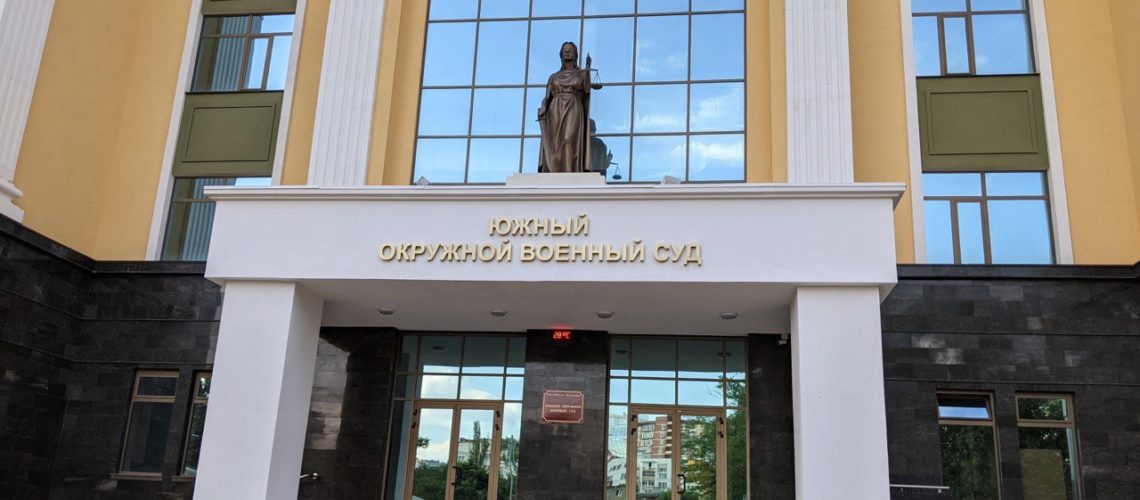
About the case: The case was initiated against 24 individuals from the “Azov” battalion (a terrorist organization forbidden in Russia [we are obligated by the Russian law to write this, ed. note]), nine of them being women, with two others exchanged before the start of the trial. The defendants are accused under Article 278 of the Criminal Code – violent seizure of power or violent retention of power, as well as Article 205.5 of the Criminal Code – organizing the activities of a terrorist organization and participating in the activities of such an organization. Several defendants are charged under Article 205.3 of the Criminal Code – training for terrorist activities.
The case is being considered by the three-judge panel, presided by Judge Vyacheslav Alexeevich Korsakov of the Southern Military District Court.
The presiding judge announced that the delay was due to the defendants’ transportation, with the clerk adding that the organization of video conferencing also contributed.
Defendant Avramova participated via video conference due to health reasons. When asked by the judge, Avramova responded that she felt relatively well.
Some defendants’ attorneys were absent, but other lawyers held power of attorney for representation. Both defense and prosecution believed there were no obstacles to continue the hearing. The court ruled to proceed.
Defendant Maria Olegovna Tykin requested a different lawyer. The presiding judge explained that she could file a challenge, providing reasons, or retain a private attorney, though the court had already appointed one. Tykin objected, claiming her current lawyer “does nothing,” doesn’t visit, and that she would like to discuss her defense strategy. The lawyer disagreed. The presiding judge intervened, instructing the attorney to visit Tykin. The attorney stated she had visited in the summer, which Tykin affirmed.
Defense attorney Mogitich, with the court’s permission, addressed additional questions to her client, with the prosecutor and presiding judge asking clarifying questions as she responded. Mogitich reported that she initially worked as a civilian canteen staff and only signed a contract with Unit 357 of the National Guard of Ukraine at the end of 2020; she had no tattoos, could not see others’ tattoos, there was no talk of killing Russians or, especially, children in the canteen; the signatures on procedural documents are hers, but she provided her statements under psychological pressure, with a bag over her head and her hands taped; she was not beaten, but observed others being beaten and felt threats were real; she signed a waiver of counsel under coercion; did not file a complaint about unauthorized investigative methods; and never joined the volunteer “Azov” regiment (recognized as a terrorist organization in Russia). She is perplexed by the allegations of her involvement in terrorist activities and refutes the assertions made during the investigation.
Following additional questions, Mogitich filed a motion to exclude evidence. The presiding judge suggested a process for reviewing exclusion statements, asking the defense to submit them collectively and immediately to allow examination. The defense agreed.
The prosecutor then presented case materials regarding defendants Labinsky and Kasatkin, who were exchanged before trial, and whose proceedings are now being heard in absentia (approved at the previous hearing).
Afterward, the presiding judge inquired whether the parties had additional evidence.
The defense attorney for Zhartov requested to admit “character references” regarding his client’s children, noted he had attached a video interrogation of a witness and its transcript, and requested to review them in the hearing. The court admitted the birth certificate and deferred the video review.
The presiding judge inquired again if there was anything further.
The prosecutor noted he would provide the addendum to the record with a response from the Donetsk People’s Republic prosecutor’s office on the detention dates of the defendants, confirming those listed in the records, and requested it be reviewed and admitted. The defense had no objections, and the court ruled to admit the response.
The prosecutor then requested to admit and examine materials from open sources on the activities of “Azov” fighters (recognized as a terrorist organization in Russia) in Mariupol – internet articles, UN High Commissioner reports in English (translated via Google Translate where needed), information on criminal cases involving the regiment’s founder Avakov and Biletsky, a requalification order, Ukraine’s Law “On Military Duty and Military Service” (translated online regarding military ranks), information about the U.S. Congress’s proposal to recognize the regiment as a terrorist organization, its designation as such by the Lugansk People’s Republic and Donetsk People’s Republic, and other related data. The prosecutor indicated he also planned to present a series of videos and to call in experts for testimony.
The defense requested time to review the materials to form an opinion on the motion. Some defense attorneys argued the materials were unrelated to their clients and that they too could find materials online.
The presiding judge interrupted the discussion, asking the court to consider three questions regarding the motion:
The presiding judge then directed the clerk to scan the documents for the defense’s review.
The presiding judge once again asked the defense which of them filed complaints about unauthorized investigative methods. Pavrionidis, Mirochenets, Gretsky submitted theirs to the court, while Smykov filed directly.
The presiding judge asked the defense if they could review the materials by 2:00 PM. The defense requested at least two weeks. The court adjourned for a 15-minute break. Before leaving, the judge asked Avramova, at the suggestion of her attorney, if she could continue participating. Avramova replied that she could manage.
After the break, the court, at the defense request, presented the interrogation protocol prepared by defense attorney Mizhgordsky (attorney Bondarenko R.A.), with the related video file displayed.
The court noted the expiration of procedural time. Defendant Timonin requested the court’s help, stating they were not allowed out for walks or to the bathhouse in the detention center, unlike Russian inmates. The presiding judge replied that this was beyond the court’s jurisdiction and explained the complaint process.
The session was adjourned.
© 2019-2025 Independent public portal on impartial trial monitoring
